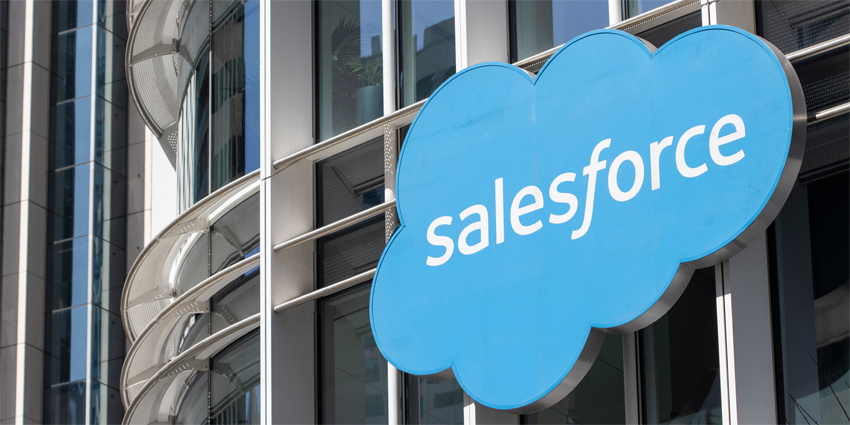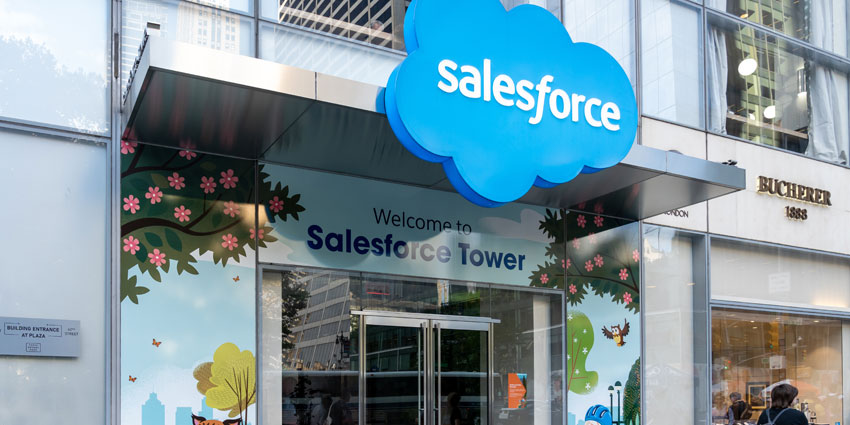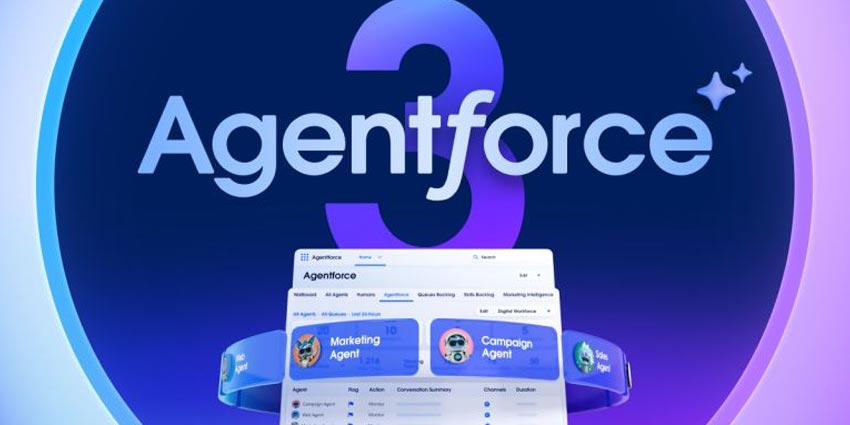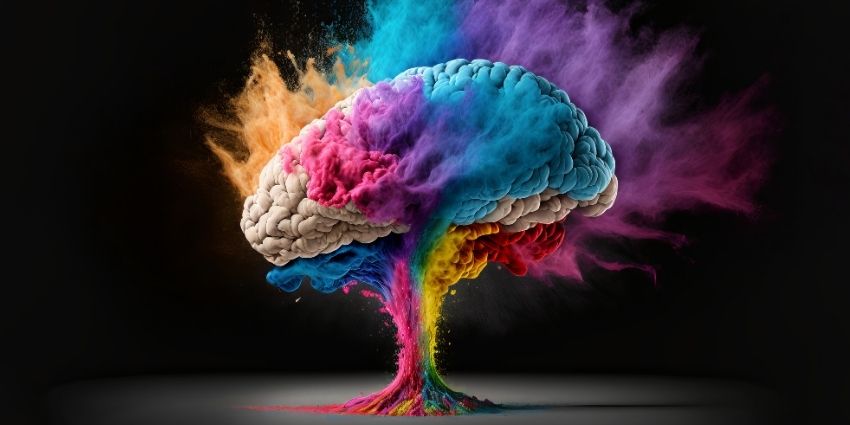Tech innovation is accelerating like never before, and 2025 is the year many brands will embark upon transformational projects to reimagine their customer experiences.
In doing so, they’ll revamp their tech ecosystems, working with tech providers offering everything from CRM and CDP platforms to CCaaS and WEM solutions.
Recognizing this, CX Today reached out to some of the most recognizable tech players from across the CX stack, who will hand-hold global organizations through their transformations.
An expert from each tech giant gave a top tech prediction for their primary subset of CX. Here’s what they had to say.
CRM
Salesforce is the leader in CRM technology, with HubSpot providing its closest competition in the midmarket space. Unsurprisingly, AI dominated both their predictions for 2025.
1. Agentic AI Takes the Mantle from Generative AI
In November 2022, 72 years after Alan Turning published the paper on ‘Computing Machinery and Intelligence’, came the rise of generative AI. Next, 2025 will see the ascendance of agents.
Indeed, agentic AI will take center stage as humans learn to work alongside AI agents to deliver exceptional customer experiences and build limitless digital workforces.
As it does so, agentic AI will offer a new level of value realization for companies, which has yet to be achieved with generative AI at scale.
For companies looking to transform their CRM and engage with their customers in a new way, starting this journey will require a strong data foundation grounded in trust and clear controls for accessing and auditing data, processes, and systems.

The modern AI-powered CRM platform will require a flexible architecture because the rate of innovation is unprecedented.
With this pace of change, balancing flexibility and guardrails with speed of execution and accuracy of the AI results will be a defining point for any organization.
- Paul O’Sullivan, CTO at Salesforce UKI
2. Customer Success Teams Will Work with AI, Reimagining CX Processes
There are two significant areas of opportunity for customer success teams in 2025. These are:
- Speeding up time to value with AI.
- Moving from onboarding to “everboarding” to meet customer expectations.
Time to value used to be limited by what customer success reps could accomplish in a day. Now, they can rebuild their processes, so humans and AI work together, helping customers get faster results and resolutions.

When it comes to onboarding, customers used to expect a long, complex implementation to get up and running. But that’s not the case anymore.
Instead, customer success teams should focus on “everboarding”: an ongoing process that’s more than just implementation and can help enable greater adoption and usage of their product.
- Jon Dick, SVP of Customer Success at HubSpot
Customer Data Platform (CDP)
Many CX platforms now place data layers over their solutions. Yet, CDPs reach across all of them, unifying that data, putting it to work, and bolstering CX-wide AI implementations. Tealium is a market leader whose prediction focuses on strengthening that data backbone.
3. Brands Develop a Vendor-Neutral Data Layer to Power Their CX Initiatives
As composable tech architecture trends mature, real-time personalization and AI activation remain key challenges that cannot be solved with cloud data warehouses (CDWs) alone.
While some organizations initially attempted to build their composable stack directly on cloud data warehouses, they’re increasingly discovering the limitations of this approach.
Many now adopt an architectural strategy that combines the depth of CDWs with a vendor-neutral data layer managed in the CDP to enhance efficiency and performance and reduce cost.
Such a centralized data layer approach is gaining traction as brands realize that keeping pace with customer expectations requires real-time processing capabilities that traditional CDW-based architectures cannot deliver.

The industry’s direction is clear as CDWs shift toward real-time capabilities in partnership with CDPs.
However, true AI-driven customer experience decisions require both robust infrastructure and a carefully planned architectural approach centered around an agile, vendor-neutral data layer.
- Matt Parisi, Director of Product Marketing at Tealium
CCaaS
NICE features as a leader in almost every analyst report into the CCaaS space. Meanwhile, Zoom has perhaps made the biggest splash of the many new market entrants. Again, AI features heavily, as both brands make big predictions below.
4. Businesses Embrace Fully Automated Customer Service
By 2025, many will embrace the idea that the future of customer service is fully automated, turning contact centers from traditional cost centers into profit centers.
With advancements in AI, automation will handle most customer interactions, efficiently resolving issues, offering proactive support, and even driving upsell opportunities.

Businesses will not only benefit from reduced operational costs but will also unlock new revenue streams through personalized AI-driven engagements.
The shift will be transformative, with AI enhancing both customer satisfaction and the bottom line as contact centers evolve into critical revenue-generating hubs.
- Barry Cooper, President of the CX Division at NICE
5. Customer Satisfaction Rebounds from Its Record Lows
Customer satisfaction (CSAT) will rebound from its all-time lows, largely driven by AI investments and adoption.
AI-first contact centers will enhance agent performance with real-time assistance and automate routine tasks, enabling human agents to tackle complex issues more effectively.
Meanwhile, predictive analytics, sentiment analysis, and intelligent routing will create hyper-personalized experiences that anticipate customer needs, leading to higher satisfaction and loyalty.
On that note, proactive outreach will evolve from a “nice-to-have” to a baseline expectation in CX.

Leveraging AI, companies will anticipate customer needs, provide preemptive solutions, and deliver tailored communications.
From guiding customers through onboarding to suggesting relevant upgrades, this proactive approach will cater to the desire for hyper-personalized, anticipatory service, enhancing satisfaction and reducing churn across every touchpoint.
- Amy Roberge, Head of Zoom Contact Center
Conversational AI
Over the past five years, Cognigy and Kore.ai have raced to the conversational AI market’s forefront, competing with IBM and Google on most enterprise shortlists. Now, as agentic AI looms, these brands pinpoint how their markets will change in 2025.
6. AI Agents Form a Digital Labor Force
The rise of AI-first, agentic solutions will drive fundamental strategy shifts in customer service.
While challenges like attrition and labor shortages persist, their impact will diminish as AI takes on more tasks, improving scalability.
Customers will find it easier to speak with Tier 2-level human support, though even rarer to talk with a human for Tier-1-level support.

Yet, the market’s rapid evolution also presents a growing challenge: many solutions appear similar in demos, making it harder to assess true enterprise readiness. Vendors without proven capabilities risk overpromising, leaving businesses to learn the hard way.
As such, organizations must look beyond surface-level offerings to identify partners capable of delivering real, scalable value.
- Alan Ranger, VP of Marketing at Cognigy
7. Customers and Employees Get Personal Assistants
By 2025, AI agents will significantly reshape consumer shopping behavior, particularly for events and experiences such as booking holidays or preparing for gatherings like birthdays or game nights.
AI-driven personal assistants will handle everything from curating personalized shopping lists for specific events to managing complex travel itineraries based on user preferences, budget, and availability.

These agents will integrate seamlessly with retailers and service providers, offering dynamic recommendations based on real-time data, including weather, location, and user feedback.
Shoppers will rely on AI to anticipate needs, suggest tailored products or services, and even automate purchases, making the entire process more intuitive, efficient, and personalized.
- Gopi Polavarapu, Chief Solutions Officer at Kore.ai
Voice of the Customer (VoC)
InMoment led the charge across the VoC market when GenAI burst onto the scene. Now, as tech advancements accelerate further, the provider shares not one but two predictions as to what might come next.
8. Everyone Gets a Digital Twin
The concept of digital twins – virtual replicas of customers built from vast amounts of data – will become a cornerstone of customer experience strategy.
Data-rich, these digital twins will allow organizations to simulate, predict, and optimize customer experiences in ways that were previously thought impossible.
These models mirror real customers’ behaviors, preferences, and needs, enabling companies to personalize interactions and predict future actions with remarkable precision.
In practical terms, they will allow businesses to test and refine CX designs before launching them in the real world, offering a risk-free environment to experiment with new strategies.
Enterprises will use these digital replicas to anticipate how different customer segments will react to a new product feature or marketing campaign.
Such a predictive capability will help optimize resource allocation, streamline operations, and improve the customer experience by addressing potential pain points before they occur.
9. Emotionally Intelligent Avatars Rise
The rise of emotionally intelligent avatars seems set to redefine customer interactions, bringing a new level of empathy to digital experiences.
These AI-driven virtual assistants will be able to recognize and respond to emotional cues, offering solutions and emotionally aware responses that create more human-like engagements.
These avatars will use advanced conversational AI to detect emotions through speech patterns, tone, and even text, adjusting their responses in real time.
For instance, a customer expressing frustration over a delayed order might trigger a calmer, more supportive tone from the avatar, helping to de-escalate the situation.

As these avatars evolve, they will enhance customer loyalty and reduce churn by making digital interactions feel ever less robotic and more connected.
Businesses that adopt this technology early will set themselves apart by offering empathetic customer service at scale, providing efficient problem-solving and an emotional connection that builds trust.
- Radi Hindawi, SVP, Enterprise Success & Services at InMoment
Workforce Engagement Management (WEM)
WEM providers centralize workforce management, quality assurance, conversational analytics, coaching, and many more solutions into a centralized platform. NICE, Verint, and Calabrio are the big three vendors that do all this. Here are their expert takes for 2025.
10. CX Teams Will Spend Time Overseeing AI
As customer service becomes fully automated, CX roles will transform significantly beyond traditional contact centers.
In 2025, human involvement will shift towards overseeing AI performance, ensuring seamless AI-human collaboration, and fostering deeper customer relationships.
CX pros will take on strategic roles, managing AI oversight to maintain service quality and accuracy while dedicating more time to customer relationship management and complex issue resolution.
Such a transformation will elevate the importance of customer experience roles, making them integral to sustaining brand loyalty and driving business growth.
- Barry Cooper, President of the CX Division at NICE
11. Customer Emotion Measures Become More Mature
AI has made significant strides in understanding language and generating responses.
In recent years, the focus has been on generative AI, particularly in the contact center industry.
In this field, recognizing emotions is vital for identifying customers at risk of leaving or agents needing support. However, verbal cues alone often fall short.
The next phase of AI development will involve analyzing speech behaviors and signals to better gauge emotions, including tone, energy, and speech rate.

Additionally, distinguishing between a “correct” response and an empathetic one in interactive voice assistants can foster customer engagement and brand advocacy.
As AI capabilities grow, there will be an increased emphasis on understanding human emotions to enhance customer connections, engagement, and loyalty.
- Dave Singer, Global Vice President, Go-To-Market Strategy for Verint
12. Self-Scheduling Puts Contact Center Agents In the Driver’s Seat
Over the past year, contact centers that have adopted self-scheduling achieved gains in critical employee- customer-, and business-focused outcomes.
Indeed, putting agents in the driving seat with the ability to move their breaks, add extra time, or take time off of calls and tasks increases employee engagement and job satisfaction, improves adherence rates, and reduces attrition.
Despite these benefits, Calabrio’s latest research shows that 46 percent of agents in European contact centers still lack these self-scheduling capabilities.
In 2025, there’s a major opportunity to close this gap.

Self-scheduling will be the first step towards fully automated scheduling, giving agents complete autonomy over their shifts—a paradigm change for contact centers, which have traditionally been ‘command and control’ organizations.
With agents calling for more flexibility, self-scheduling will be a major trend for 2025, paving the way for smarter, more productive, and more efficient contact centers in the years ahead.
- Ed Creasey, Vice President of Solution Engineering at Calabrio
CPaaS
The Gartner Magic Quadrant is the most widely utilized vendor evaluation in enterprise tech. In the 2024 CPaaS edition, Twilio, Vonage, and Sinch are three of the four market leaders. Below, pinpoint how the tech may change customer experiences in 2025.
13. More Brands Make Hyper-Personalization a Reality
CX pros have talked about making personalization a reality for over 25 years. However, it has been beyond the reach of most brands, with meaningful real-time personalization preserved for the few.
Yet, in 2025, the tools to deliver will be at brands’ fingertips.
According to Gartner, 90 percent of global enterprises will utilize CPaaS for customer experience and engagement by 2028.
Combining communication channels with AI capabilities and customer data will be the secret behind personalization at scale across CPaaS.

For example, with unified customer profiles pulling first-party data across all touchpoints in the customer journey, AI can deliver context and insights to customer service teams during live calls or chats, empowering them to provide a personal customer experience.
In 2025, industries like retail, telecommunications, and healthcare will leverage CPaaS to enhance the CX, topping up the emotional ‘bank account’ that will keep customers loyal to the brand.
- Peter Bell, VP of Marketing EMEA, Twilio
14. RCS Enables Active Customer Engagement
In 2025, RCS will become the norm for businesses. That means consumers will begin to expect features like branded messages, typing indicators, and enriched content like images and videos as standard, not as a ‘nice to have’.
Interactive elements like suggested replies allow customers to respond, book appointments, or send common inquiries almost instantly.
Once customers begin to see the convenience of communicating with organizations this way, they’ll expect it across the board.
For businesses, RCS provides real-time insights into customer behavior and agent performance. RCS also enables organizations to forge more personal customer relationships, leading to down-the-line loyalty.

Finally, RCS is integral to providing conversational commerce, enabling customers to make purchases without leaving the chat.
If 2024 was the year of social commerce, 2025 will be the year of active customer engagement, and RCS will be key to this shift.
- Colin Brown, Head of API Product Management at Vonage
15. RCS Sparks Significant CPaaS Growth
One key trend shaping the future of customer communications and CPaaS growth is the increasing prominence of RCS.
With Apple adding RCS support in September with iOS 18 and more carriers embracing RCS, brands’ desire to use it is increasing.
The potential of RCS is substantial. Juniper Research suggests RCS business messages delivered through CPaaS platforms will grow from 2.5 billion in 2024 to 86 billion by 2028.
As a key CPaaS platform with strong connections to Google and mobile carriers, Sinch announced earlier this year that we have delivered more than 1 billion RCS business messages worldwide.
RCS offers businesses a richer experience with interactive features like media sharing, suggested replies, and delivery receipts.
Verified sender IDs and branding improve security and trust over SMS.

In the past, business campaigns using RCS messaging have shown an 80 percent conversion rate, indicating its effectiveness in driving engagement and sales.
Sinch expects RCS to continue advancing the CPaaS market, enabling brands to deliver more engaging and secure customer interactions.
- Miriam Liszewski, RCS Commercial Product Manager at Sinch
Sinch expects RCS will continue to advance the CPaaS market, enabling brands to deliver more engaging and secure customer interactions.
Miss out on our previous CX Today roundtable? Catch up here: Customer Data Platforms: Next-Gen Features, Trends, & Providers









